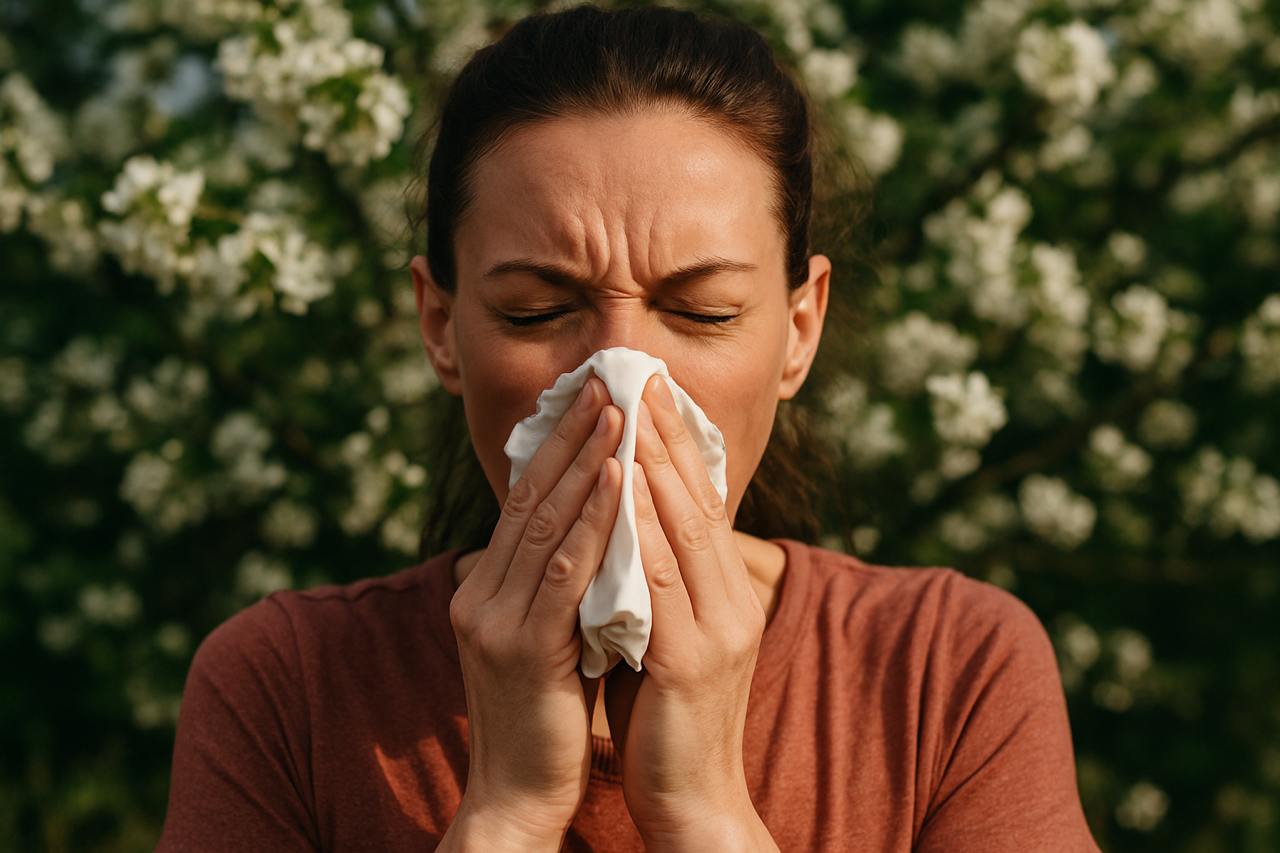
Allergy treatment online – for mild or seasonal symptoms
Speak with a doctor and get a personalised treatment plan from home — without the wait.
 Effective for sneezing, itching, skin reactions and other mild allergy symptoms
Effective for sneezing, itching, skin reactions and other mild allergy symptoms  Medical review within hours — skip long queues and appointments
Medical review within hours — skip long queues and appointments  Prescription issued if clinically appropriate — valid for your local pharmacy
Prescription issued if clinically appropriate — valid for your local pharmacy 
How to get treatment for allergies online
Recurring allergy symptoms? A doctor will review your case and provide a personalised plan — no clinic visit required.

Note: You’ll only be charged if the request is approved. In urgent situations, please contact emergency services.
Online treatment for seasonal and mild allergy symptoms
If you already recognise your typical reactions – don’t wait. Get a doctor-reviewed treatment plan online, without going to a clinic.
Help for typical allergy reactions
Sneezing, itching, or watery eyes coming back every year? A doctor can help confirm the cause and recommend the right treatment.
Effective for seasonal allergies
Allergic to pollen, dust, or animals? Manage flare-ups in advance with personalised care.
Quick medical review
A licensed doctor typically reviews your questionnaire within a few hours — no scheduling needed.
No appointment needed
You don’t need to wait for a clinic visit. Just fill out the online form — a doctor will review your case and recommend next steps.
E-prescription
If your condition meets the criteria for remote care, the doctor may issue a prescription valid in your country.
Transparent fixed pricing
You pay only for the medical review. No hidden charges, subscriptions, or added fees.
Seasonal allergies: symptoms, triggers, and doctor-approved treatments
Understand the causes and patterns of seasonal allergies, what symptoms require attention, and how to get safe, doctor-reviewed care without delay. Optimised for those searching for pollen allergies, mild hay fever, or antihistamine prescriptions online.
What causes allergies and how symptoms typically appear
Common symptoms include sneezing, nasal congestion, itchy eyes, and skin irritation. Seasonal allergies often flare during specific times of year, especially in spring and autumn when pollen counts rise.
Understanding your allergy type and identifying patterns helps you prepare for flare-ups and reduce their impact. Keeping a symptom diary or noting environmental triggers is often the first step in effective allergy control.
Even mild reactions, if ignored, can become chronic or affect overall wellbeing. Timely support helps manage flare-ups and prevents unnecessary complications like sinus infections or sleep problems.
Types of seasonal and environmental allergies
Dust allergies and pet allergies are also common and often lead to year-round symptoms like nasal congestion, sneezing, or skin irritation. These symptoms usually worsen in poorly ventilated spaces or during cleaning.
Contact allergies can be caused by household cleaning products, latex, cosmetics, or specific fabrics. Symptoms include skin rashes or itching, which usually improve once the allergen is removed.
Many people experience multiple mild allergies at once — combining seasonal with environmental triggers. If your symptoms are recurring or impact your quality of life, even outside peak seasons, it’s time to consider personalised treatment.
Why early treatment matters — even for mild allergy symptoms
Symptoms such as sneezing, itchy eyes, and nasal congestion can disrupt sleep, lower focus, and reduce energy levels. These issues may seem minor but can compound over time if left unmanaged.
Delaying treatment can also lead to hypersensitivity, where even small amounts of allergen trigger strong symptoms. Over-the-counter medications might offer temporary relief, but long-term control requires medical input.
Getting medical advice early ensures that treatment is tailored, safe, and effective. Especially for those who already suspect seasonal allergies, timely care helps prevent escalation and restore everyday comfort.
How doctors treat seasonal allergies remotely
Online allergy treatment starts with a symptom questionnaire. Based on your answers, the doctor will recommend an appropriate treatment plan. In many cases, an e-prescription can be issued for your local pharmacy.
Doctors also consider lifestyle factors, like exposure to allergens, work or travel environments, and previous treatment responses. This ensures a holistic approach, even via remote consultation.
For people with regular flare-ups, ongoing prevention may include trigger avoidance tips, testing recommendations, or long-term management strategies. Online consultations are ideal for recurring symptoms that don’t require in-person testing.
How to tell if it’s a cold or an allergy
Allergies often begin suddenly, without fever or fatigue. You might notice clear nasal discharge, persistent sneezing, or itchy eyes — especially after being outdoors, around pets, or in dusty environments.
Colds typically resolve within 7–10 days. If your symptoms last longer or recur during specific seasons, it’s likely allergic rhinitis, not a viral infection.
Misidentifying allergies as a cold can delay proper care. If you’ve noticed a pattern or your symptoms match typical allergy signs, getting a doctor-reviewed treatment plan can help restore comfort faster.
Patients love


Your guide to healthcare in Spain
Practical information about the healthcare system, doctors and medical services in Spain.
Frequently asked questions about allergy treatment
Get answers to common questions about seasonal allergies, symptoms, and treatment options available through our medical questionnaire.









